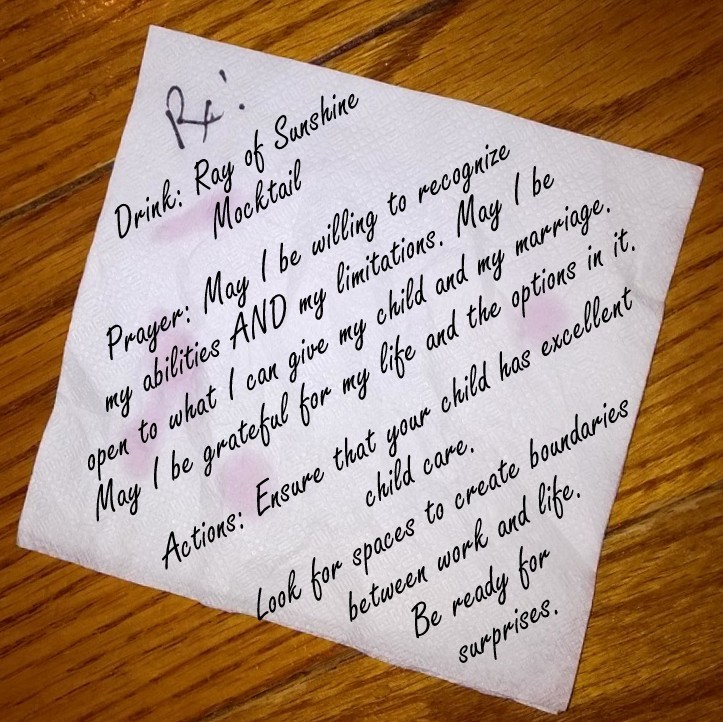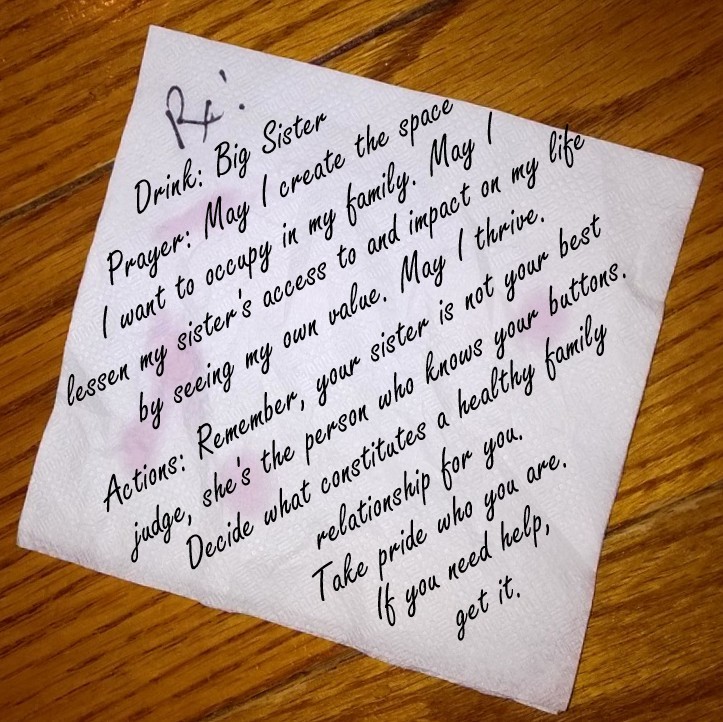Editors Note: Terri and Ann, the Bartender and the Priestess, are back after a long hiatus with a change in focus. We’re no longer responding to events in people’s lives, but rather exploring the cultures and philosophies that undergird the problems of today. Welcome to Life Matters: Suffering.
Terri: Early in the film Steel Magnolias we meet Annelle, an aspiring glamour technician who takes a long walk to Truvy’s Beauty Spot in search of a new job. Truvy assumes that Annelle must live close by because she doesn’t have a car; instead, Annelle tells Truvy she’s living at Robeline’s Boarding House, across the river and quite far, for a walking commute. Truvy waxes poetic about Annelle’s landlady.
“Ruth Robeline. Now there is a story for you. She is a troubled, twisted soul. Her whole life has been an experiment in terror. Her husband got killed in World War II. Then her son got killed in Vietnam. When it comes to suffering, she is right up there with Elizabeth Taylor.”
And there it is. There is the glamorization of suffering, the glorification of suffering, the admiration, even, of suffering. Who better to look to when we feel like life is kicking us in the teeth, than someone who can get kicked in the teeth, beautifully? Someone who can face that which plagues them with a spine made of steel…
Oh, wait. Elizabeth Taylor broke her back like five times and had scoliosis and osteoporosis. There’s a pretty good chance she actually DID have steel in there. Moving on.
Ann: I grew up as Pollyanna. I still struggle with perky. Everything is wonderful! And if it’s not, then it’s not fair. Because life is fair. Or so you think when you’re growing up insulated, white, and middle-classed. Turns out that death comes for even your friends, so you begin to notice suffering. When you encounter this pain often enough, you may begin to notice that suffering is far bigger than simply personal pain.
The concept of suffering took a long time for me to understand. Partially because I grew up in a religious tradition that talked in horrible, unrealistic ways about suffering — celebrating life only after death. It took me a long time to embrace the suffering that accompanies life, but that is also side by side with joy. For me life is really about finding the balance. Pursuing the joy and accepting the sorrow and suffering. Suffering is not noble; it is just a fact of life — we are not redeemed by it. We live with and through it.
In our own lives why not make time to celebrate Life? In the world, let’s notice where suffering is. If we can be helpful, we should be. So much of suffering is institutionalized. There are systems set up to keep people in abysmal situations. We call them their fault and think it’s fine that they suffer. It is not.
Terri: We like to tell ourselves stories. We like to think that our behavior goes into some celestial meritocracy, and when things go deeply and tragically south—the spouse leaves, the loved one passes away, the prognosis is bleak, the jobs have dried up—that these things happen for “a reason”. Or, that the sufferer “deserves” it. And we particularly want reasons if we’ve led a decent life. When we’ve jumped through all the hoops, played all the correct games, made responsible choices, paid taxes on time, we get this idea that we insulate ourselves from the bad things in life and so we want to know why. Why did I always follow the rules if I don’t get to “win”? Why didn’t my good behavior—or God, fate, karma—protect me? Why do I have to carry this burden? What did I do to deserve it? It’s why books with titles like When Bad Things Happen to Good People can be in print for 38 years (and still going!).
The hard point is, you probably don’t deserve “it”, whatever “it” is. No one deserves cancer, or to be hungry, or homelessness, or to endure the daily grind of suffering + life-goes-on-even-though-I-can-barely-lift-my-head-off-the-pillow. And chirpy pseudo-feel-good-statements generally fall far short of helping. Look at this one: “God won’t give you anything you can’t bear!” So…if I truly can’t handle this, then on top of it all, I’m weak AND letting God down? Or how about: “I know this is hard, but things can be worse!” As though looking at the un-ticked boxes in the misery checklist will make current pain subside, somehow. Or even more to it, that looking at someone who’s checked the boxes you haven’t is somehow…better? Is wiping your brow and uttering “Whew…at least that’s not me!” really helpful? Let’s call that dynamic it what it is. That’s not coping. That’s gloating.
Ann: We have a cult of suffering. I was flabbergasted the other day. I saw a video on FB where a marathon runner fell and broke her leg early in the race. She then crawled to the finish. The subtitles read… although in agony, nevertheless, she persevered.
Why?
Could that have been good for her broken leg? Or how about the knees she plodded across concrete on for miles? That’s not noble. That’s stupid and self-destructive. There will be another marathon next year. Or not. That’s not pulling children or the elderly out of a raging river, that’s endangering yourself for no good reason and looking for prizes and head pats.
Terri: I have to interject here. We congratulate people who eschew help because they’re “pulling themselves up by their bootstraps”. Which is nice and all, if the problem is not so big that you can’t handle it alone. But sometimes, the problem is systemic and can’t be resolved by stick-to-it-iveness. Or problems stack and become overwhelming (we’ve all heard the stories of how a marriage crumbled after the loss of the child, creating suffering upon suffering). Sometimes, we need to gather in support of our friends and neighbors. Sometimes, we have to admit we can’t do it all alone, and help ourselves by asking for help. Why do we form communities if we don’t make use of them?
Ann: There is so much work to do in this world. We will all encounter pain. There may be times that we will have to work through the pain. And that’s life, as hard as it is to acknowledge. Or at least part of life.
I believe very deeply that we must cultivate Joy and Justice. Our personal sorrow is a measure of how well we love our lives and the people we encounter. Our passion for Justice should cause us to put our hearts and hands to dismantling the causes of institutionalized suffering and easing, as best we can, the hearts of those caught in the cycle.
Make life simpler. Grieve the hard parts. Make the other parts joyous, for you and for others.
Terri: And celebrate what is good in your own life, NOT what is bad in someone else’s.
Ann: May we make it so.


